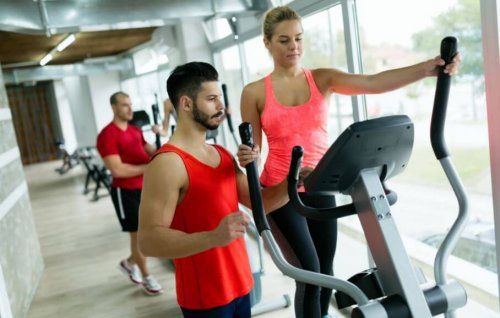Improve Your Level of Cardiovascular Fitness

Most athletes know that cardiovascular exercise is very important for health. Among other things, cardio helps you burn more calories and lose weight. It also helps keep the heart and lungs in good shape. Due to these reasons, among others, we’ll tell you how to improve your cardiovascular fitness here.
There’s no doubt that the objective of cardiovascular exercises is to increase your heart rate so you can breathe more forcefully.
Through this process, you burn more calories. The only problem is that it’s not very easy to get to the level of cardiovascular health where we can give training our all.
For this to be possible, you need more endurance. Endurance requires that the circulatory and respiratory systems provide the energy the working muscles need. It should support sustained physical activity. So if you’re among the athletes who would like to train harder and longer, this article is for you.
We’ve prepared a list with some advice that could be very useful for people looking to improve their cardiovascular endurance. Take a look below.
1- Pick a cardiovascular activity that you like
This is one of the most important aspects you have to consider when doing this type of training. No one wants to spend their time with an activity or exercise they don’t like. So the best exercise for you is the one you enjoy the most. It’s the one that gives you the willpower and motivation to continually surpass your personal records.

For example, walking is a good activity to get started with. It doesn’t require any special equipment and you can do it anywhere. Any type of continuous movement, such as riding a bicycle, swimming, running, going upstairs, or dancing can make for good cardiovascular exercise.
2- Stay hydrated
Even being just a little dehydrated can significantly affect your body’s ability to move. That’s why consuming the right volume of water is crucial. In order to maximize your performance – to train longer – you need to take sips of water throughout the training session. That makes listening to your body one of the most important keys to improving your cardiovascular fitness.
3- Progressively increase the difficulty
Increase the time you train a few minutes each week until you get to half an hour a session. Even though it might not seem like you’re doing a lot more, it’s important to demand a little more of yourself each time you train. It’s better to make gradual improvements than to start too hard and expose yourself to suffering unexpected injuries.

With regard to your distance and pace, you shouldn’t be too worried. For the first few weeks, you should just focus on concentrating and finishing your whole session. After a few weeks, you can change up your routine, adding another day of exercise or increasing your pace.
Other ways to progress are to increase the intensity of exercise, including a new activity, or increasing your total training time.
4- Don’t skip the carbohydrates
Carbohydrates are crucial for athletic performance. You shouldn’t try to eliminate them from your diet if you want to stay fit. This is especially true when your goal is to improve your endurance. They’re the primary source of fuel for your body and they allow you to keep a productive pace for longer.
That’s why you should calculate how many carbohydrates you need for your routines. You have to adapt your diet to the type of training you’re doing. Keep in mind that carbohydrates are the fuel that increases your energy during training.
It’s also less probable that they’ll be stored as body fat when you use them during training.
5- Interval training
Most people know that interval training is great for weight loss. However, you should also know that it’s effective for increasing your endurance and forcing your heart to pump more blood. This helps you improve your cardiovascular fitness level.

Keep in mind that when the heart pumps more blood, that means more oxygen goes to the active muscles in each session. That keeps fatigue at bay. That being said, we recommend you do some 20 minutes of interval training two or three times a week.
If you put this advice into practice, nothing should impede your ability to improve your cardiovascular fitness little by little. We’re completely sure that if you stay patient, motivated, and keep going, you’ll reach any goal you set for yourself!
Most athletes know that cardiovascular exercise is very important for health. Among other things, cardio helps you burn more calories and lose weight. It also helps keep the heart and lungs in good shape. Due to these reasons, among others, we’ll tell you how to improve your cardiovascular fitness here.
There’s no doubt that the objective of cardiovascular exercises is to increase your heart rate so you can breathe more forcefully.
Through this process, you burn more calories. The only problem is that it’s not very easy to get to the level of cardiovascular health where we can give training our all.
For this to be possible, you need more endurance. Endurance requires that the circulatory and respiratory systems provide the energy the working muscles need. It should support sustained physical activity. So if you’re among the athletes who would like to train harder and longer, this article is for you.
We’ve prepared a list with some advice that could be very useful for people looking to improve their cardiovascular endurance. Take a look below.
1- Pick a cardiovascular activity that you like
This is one of the most important aspects you have to consider when doing this type of training. No one wants to spend their time with an activity or exercise they don’t like. So the best exercise for you is the one you enjoy the most. It’s the one that gives you the willpower and motivation to continually surpass your personal records.

For example, walking is a good activity to get started with. It doesn’t require any special equipment and you can do it anywhere. Any type of continuous movement, such as riding a bicycle, swimming, running, going upstairs, or dancing can make for good cardiovascular exercise.
2- Stay hydrated
Even being just a little dehydrated can significantly affect your body’s ability to move. That’s why consuming the right volume of water is crucial. In order to maximize your performance – to train longer – you need to take sips of water throughout the training session. That makes listening to your body one of the most important keys to improving your cardiovascular fitness.
3- Progressively increase the difficulty
Increase the time you train a few minutes each week until you get to half an hour a session. Even though it might not seem like you’re doing a lot more, it’s important to demand a little more of yourself each time you train. It’s better to make gradual improvements than to start too hard and expose yourself to suffering unexpected injuries.

With regard to your distance and pace, you shouldn’t be too worried. For the first few weeks, you should just focus on concentrating and finishing your whole session. After a few weeks, you can change up your routine, adding another day of exercise or increasing your pace.
Other ways to progress are to increase the intensity of exercise, including a new activity, or increasing your total training time.
4- Don’t skip the carbohydrates
Carbohydrates are crucial for athletic performance. You shouldn’t try to eliminate them from your diet if you want to stay fit. This is especially true when your goal is to improve your endurance. They’re the primary source of fuel for your body and they allow you to keep a productive pace for longer.
That’s why you should calculate how many carbohydrates you need for your routines. You have to adapt your diet to the type of training you’re doing. Keep in mind that carbohydrates are the fuel that increases your energy during training.
It’s also less probable that they’ll be stored as body fat when you use them during training.
5- Interval training
Most people know that interval training is great for weight loss. However, you should also know that it’s effective for increasing your endurance and forcing your heart to pump more blood. This helps you improve your cardiovascular fitness level.

Keep in mind that when the heart pumps more blood, that means more oxygen goes to the active muscles in each session. That keeps fatigue at bay. That being said, we recommend you do some 20 minutes of interval training two or three times a week.
If you put this advice into practice, nothing should impede your ability to improve your cardiovascular fitness little by little. We’re completely sure that if you stay patient, motivated, and keep going, you’ll reach any goal you set for yourself!
This text is provided for informational purposes only and does not replace consultation with a professional. If in doubt, consult your specialist.








